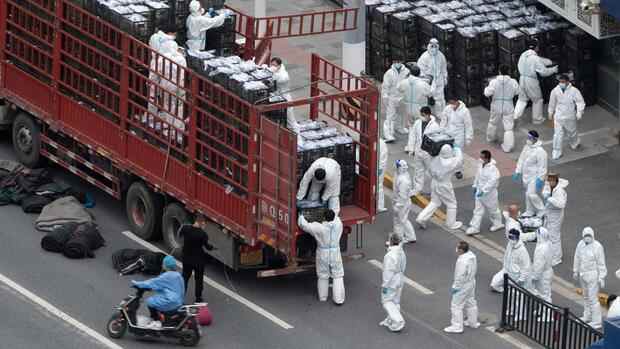Beijing It is rare that foreign business representatives in China criticize the government as unanimously and clearly as they did this Wednesday. The European Chamber of Commerce had invited to assess the situation in view of the large-scale exit restrictions and production stops in the world’s second largest economy – and the representatives of European companies drew a desolate situation.
Employees are increasingly trying to get their families out of the country, said Bettina Schön-Behanzin, vice-president of the EU chamber and representative of the business association in Shanghai. The economic metropolis of Shanghai has been in an almost city-wide lockdown since March 28th. The city’s 25 million residents are not allowed to leave their homes – not even to do shopping or go to the doctor. Most companies had to stop their production.
Some of the residents of Shanghai have to do several Covid tests every day. Those who test positive are admitted to central quarantine facilities. In the past few days, videos have been circulating that show the desolate situation in the hastily built mass accommodation: Hundreds of beds are packed tightly together in the huge halls, there are no showers, no privacy.
The conditions are also difficult to bear for people in home quarantine. “We see a serious shortage of food,” says Schön-Behanzin. The rest of the country doesn’t look much better. In Shenyang, for example, where the car manufacturer BMW has a large plant, there has been a strict lockdown since March 22nd.
Top jobs of the day
Find the best jobs now and
be notified by email.
“This has a severe impact on the large companies here,” says Harald Kumpfert from the local EU chamber. As in Shanghai, it is not clear in Shenyang when the lockdown will end. “Companies are worried about their future,” says Kumpfert. “They don’t see a strategy that will end this type of on-off economy – that is, after the Covid wave is before the Covid wave.”
New record number of cases
China is currently fighting the worst outbreak of the virus since the beginning of the corona pandemic in early 2020. Until March, the world’s second largest economy had rarely counted more than 100 new infections thanks to strict preventive measures. But for a few weeks now, China has not been able to get a wave of infections under control, despite country-wide restrictive measures.
On Wednesday, the Chinese Health Commission reported a new record of more than 20,000 new infections in the country of 1.4 billion people. In Shanghai alone, more than 17,000 more cases were added despite the draconian lockdown.
Everyone is stunned that this is happening in China’s most progressive city. EU Chamber President Jörg Wuttke
In particular, the sealing off of Shanghai, the metropolis that is considered one of the most liberal in the People’s Republic, surprised international business representatives. “Everyone is stunned that this is happening in China’s most advanced city,” says EU Chamber President Jörg Wuttke. “It’s a shock.”
The ongoing lockdowns are already putting significant pressure on the economy of the world’s second largest economy. The Caixin Purchasing Managers’ Index, compiled by private media company Caixin, was released on Wednesday and fell to 42 points in March — anything below 50 indicates a deterioration in sentiment.
It was the first time the index had slipped below that mark in seven months, down from 50.2 in February. Analysts such as Deutsche Bank have already lowered the forecast for growth in the Chinese economy for the current year from 5.1 to 4.4 percent. The Chinese government had set itself a growth target of 5.5 percent.
Business representatives complain about “lack of foresight”
Not only among the local population, but also among international companies, dissatisfaction with the sometimes blatant mismanagement of the crisis has increased in recent weeks. There is a lack of communication, the authorities are sending confusing messages, criticized Massimo Bagnasco from the Southwest representation of the EU chamber.
People with a positive test result must prepare for quarantine in mass accommodation.
(Photo: dpa)
Klaus Zenkel, Vice-President of the EU Chamber in the Chinese tech hub Shenzhen, attested to the government’s “lack of foresight and a lack of adaptability” in view of the city’s repeated partial and full lockdowns. Due to the ongoing travel restrictions and lockdowns, the country risks more isolation and a loss of trust in China among international companies.
The description of the situation corresponds to a survey by the German Chamber of Commerce Abroad (AHK) at the end of March. Because the draconian Covid restrictions were now added to the uncertainties caused by the Ukraine war, companies were “increasingly concerned about their business,” according to the business representation. According to a survey of member companies, around half of all German companies are already feeling a complete disruption or serious impact on logistics, warehousing and their supply chains.
Transports between the provinces of China are now “very difficult”, says EU Chamber Vice President Schön-Behanzin. On the one hand, there were no drivers because many are not allowed to leave their homes due to the Covid restrictions. It is also difficult to get the necessary documents and tests needed to travel between provinces.
The port in Shanghai is still in operation, but only with significantly reduced capacity due to the problems in the rest of the country. Members of the EU chamber estimate that the volume in the ports of Shanghai has already fallen by 40 percent compared to the previous week.
More: Shanghai extends lockdown indefinitely – experts fear “heavy blow” to China’s economy.
